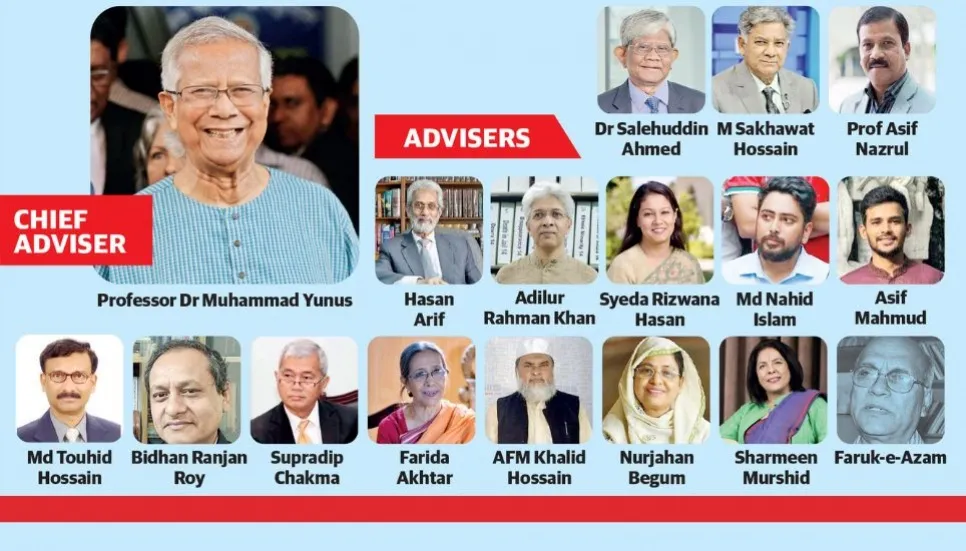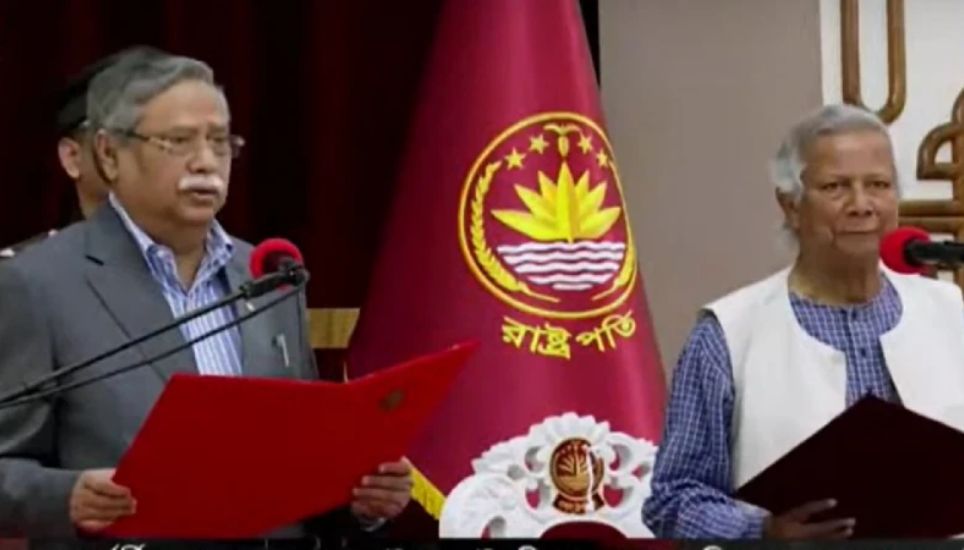
After the thundering ouster of Sheikh Hasina’s Awami league-led administration in a mass uprising led by students, a 17-member interim government led by Nobel laureate Prof Dr Muhammad Yunus has taken oath with the aim to restore law and order and rebuild Bangladesh.
Globally acclaimed economist Yunus, 84, was sworn-in as the chief adviser of the interim government by President Mohammed Shahabuddin at the Durbar Hall of Bangabhaban in Dhaka on Thursday night, in front of political leaders, civil society leaders, generals and diplomats.
The president then administered the oath of office to the 13 of the 16 other advisers of the government, established by the military, four days after the mass upsurge forced Sheikh Hasina to resign from her prime minister post and flee to India.

The other advisers of the interim government are Dr Salehuddin Ahmed, former governor of Bangladesh Bank; Brigadier General (retired) M Sakhawat Hossain; Dhaka University law department teacher Prof Asif Nazrul; Hasan Arif, former attorney general and adviser of Fakhruddin Ahmed-led caretaker government; Md Touhid Hossain, former foreign secretary; Syeda Rizwana Hasan, chief executive of BELA; Md Nahid Islam, DU student and key organiser of the Students Against Discrimination Movement; Asif Mahmud, DU student and key organiser of the Students Against Discrimination Movement; Adilur Rahman Khan, founder of rights group Odhikar; Supradip Chakma, chairman of Chittagong Hill Tracts Development Board; Farida Akhtar; women's rights activist; Director cum Professor Bidhan Ranjan Roy of the psychiatry department at the National Institute of Mental Health and Hospital; AFM Khalid Hossain, nayeb-e-ameer of Hefazat-e-Islam and adviser of Islami Andolan Bangladesh; Nurjahan Begum, Grameen Telecom trustee; Sharmeen Murshid, freedom fighter; and Bir Pratik Faruk-e-Azam.
Of them, Supradip, Bidhan and Faruk could not be sworn in on Thursday as they are outside the capital. They will take oath later.
Muhammad Yunus reached Bangabhaban at 8:45pm while the other 13 reached around the same time. The oath-taking ceremony, conducted by Cabinet Secretary Md Mahbub Hossain, started at 9pm.
Yunus first took oath as the chief adviser and then signed the oath of secrecy. The 13 advisers also signed the oath of secrecy after taking oath.
Senior leaders of different political parties including BNP were present at the oath-taking ceremony. No one from Awami League was seen at Bangabhaban.
Diplomats from different countries including the UK, Japan, China, Philippines, Iran, Argentina, Qatar, The Netherlands and the UAE were present.
Indian Prime Minister Narendra Modi was the first world leader to congratulated Yunus on Thursday night.
Modi offered his "best wishes" to Yunus, saying New Delhi was "committed" to working with neighbouring Dhaka.
"My best wishes to Professor Muhammad Yunus on the assumption of his new responsibilities. India remains committed to working with Bangladesh to fulfil the shared aspirations of both our peoples for peace, security and development,” Modi wrote on social media platform X.
'Second independence'
Earlier in the afternoon on Thursday, Yunus celebrated what he termed Bangladesh's "second independence" upon his return from Europe, aiming to steer the nation back to democracy.
Yunus returned to Dhaka after a weekend of unrest that resulted in hundreds of fatalities and led to the military turning against Hasina.
"Today is a glorious day for us," Yunus declared to reporters at Hazrat Shahjalal International Airport in Dhaka. "Bangladesh has created a new victory day. Bangladesh has got a second independence."
Yunus called for the restoration of order after weeks of violence that left at least 455 people dead, calling on citizens to guard each other, including minorities who came under attack.
"Law and order is our first task... We cannot take a step forward unless we fix the law and order situation," he said. "My call to the people is if you have trust in me, then make sure there will be no attacks against anyone, anywhere in the country."
"Every person is our brother... our mission is to safeguard them," he said, adding, "the whole of Bangladesh is one big family."
Sheikh Hasina, who faced allegations of extensive human rights abuses including imprisoning political rivals, fled to neighbouring India on Monday as mass protests engulfed Dhaka.
The military subsequently acquiesced to student demands for Yunus — who won the Nobel Prize in 2006 for his innovative microfinancing initiatives — to head the interim government.
Yunus was visibly moved on Thursday as he remembered student activist Abu Sayeed, who was shot dead by police in July. He honoured the youth who ignited the protest movement and those who risked everything for change.
"They protected the nation and gave it a new life", he said.
‘Beautiful democratic process’
During Hasina's tenure, Yunus faced over 100 criminal charges and a smear campaign by a state-backed Islamic agency accusing him of promoting homosexuality.
This year, Yunus had travelled abroad while on bail after being sentenced to six months in prison on what was widely regarded as a politically motivated charge, from which a Dhaka court acquitted him on Wednesday.
Army chief General Waker-Uz-Zaman expressed his support for Yunus on Wednesday. "I am certain that he will be able to take us through a beautiful democratic process.”
Details about the planned government remain sparse, including the military's role.
However, Bangladeshis expressed hope during a rally in Dhaka on Wednesday, organised by the former opposition Bangladesh National Party (BNP).
"I expect that a national government will be formed with everyone's consent in a beautiful way," Moynul Islam Pintu told the reporters. "I hope the country will be managed well, and the police force reformed to prevent harassment."
Monday's events culminated over a month of unrest that started as protests against a government job quota plan but evolved into an anti-Hasina movement.
The military's switching of allegiance was the decisive factor in her demise. It has since acceded to a range of other demands from the student leaders.
The president dissolved parliament on Tuesday, a key demand of the students and the BNP.